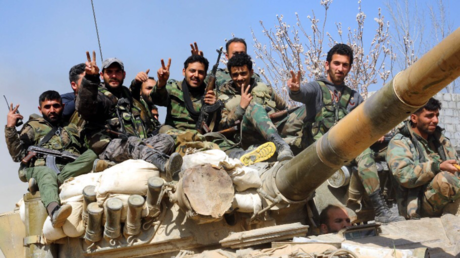Early deal reached for Islamic militants to leave E. Ghouta – Russian military
Militants from Jaysh al-Islam have agreed to leave the enclave of eastern Ghouta near Damascus, Syria. They will have to clear barricades and provide maps of minefields they had laid in the area.
The Reconciliation Center in Syria, tasked by the Russian Defense Ministry with restoring stability in the war-torn country, says "a preliminary agreement has been reached for extremists from the Jaysh al-Islam group to leave eastern Ghouta."
Jaysh al-Islam is one of the last major militant groups holding out in Douma, a major city in the eastern Ghouta area. The group has been accused of using terrorist tactics by Russia and Syria, including the use of civilians as human shields.
"Upon leaving Douma, the militants must provide maps of minefields, voluntarily de-mine buildings, clear barricades and main transport routes," a press statement by the Reconciliation Center says.
Listing the progress of the operation in eastern Ghouta, the center says that a total of 153,240 people have left the area through humanitarian corridors, including almost 30,000 from Douma, where a corridor is now open not only for civilians but for militants and their families as well. In other areas of eastern Ghouta, the Reconciliation Center says measures are being taken to return displaced people from refugee camps to their homes.
Earlier, Syrian forces reported liberating all militant-held settlements in eastern Ghouta and lifting a blockade of a main highway connecting Damascus to the rest of the country. The area had been under militant occupation since 2012. In February 2018, Syrian troops began the operation to retake the area, and Russia brokered the creation of humanitarian corridors to allow locals to escape the siege. Militant groups that agreed to cooperate were also allowed to escape to other rebel-held areas.




